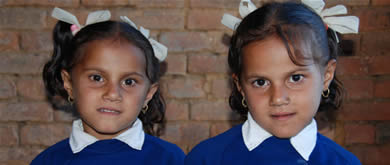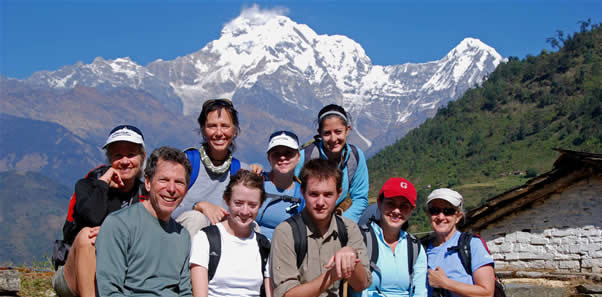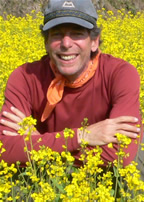Saving Girls in Nepal
Learning How to Transform Lives by Helping Others
January 22, 2008
By Mimi Ko Cruz
Six-year-old twins Ganga and Jumina Karki walk two hours through two mountain passes each morning to get to school in Nepal. Their mother, who is dying of AIDS, accompanies them. Their father has already died of AIDS.
The girls' future as soon-to-be orphans, struck the heart of Kottler, chair and professor of counseling, who met them on his recent visit to Nepal.
"I was able to reassure their mother that we would take care of her children after she was gone," Kottler said about his Nepal-based charity that helps save girls from being sold into sex slavery and provides them with an education. "That was one of the most emotional experiences of my life and I'm fighting back tears this moment as I remember the smile of relief on that mother's face. There is nothing I have ever done, and nothing I will ever do, that is so important and meaningful."

Ganga and Jumina Karki
Kottler will discuss his Nepal experiences Wednesday, Feb. 27, at a free public lecture, “Changing People’s Lives While Transforming Your Own: Paths to Social Justice and Global Human Rights," being sponsored by the Women's Center.
Kottler and one of his former students, Kiran Regmi, an obstetrician and researcher in Nepal, established the Madhav Ghimire Foundation in 2001. Through the foundation, 60 girls have been diverted from possible futures working in brothels where they most likely would contract AIDS. The organization sends the girls to school and feeds and clothes them. It costs about $100 a year to support each girl, and the money is raised through donations.
Kottler said the foundation has raised more than $30,000 during the past year for the cause. He travels to Nepal each winter to check on the girls, their families and their progress, and to consult with their teachers. Each year, a group of his students, fellow faculty members and friends make the trip with him. Each pays for his or her own travel expenses.
"The work sometimes is very emotionally draining," Kottler said. "But, I'm haunted by the children's faces. I have some of their photographs hanging in my office to remind me every day about what we are doing and how many lives depend on the effort. I love my teaching and writing at Cal State Fullerton but, working in Nepal opens up a whole other dimension of what it means to serve others. That's why I enjoy taking colleagues and students over there, so they can experience the beauty of the people and the country. It's impossible to go there, to spend time in the villages, and come back the same."
Kottler and his foundation are helping people who would otherwise not receive any support, he said. "We focus on girls from the lowest caste in rural areas, those who come from families who earn less than $200 per year. Many cannot attend school because they can't afford the minimal fees. Many are barefoot even though they live in the Himalayas. Helping them is so important and meaningful."
Faced with starvation, infectious diseases, illiteracy and poverty, parents in Nepal sell an estimated 7,000 of their daughters into sex slavery each year.
The life expectancy in Nepal is 57, and 90 percent of the population has no access to health care. According to the U.S. Agency for International Development, the first case of HIV in Nepal was reported in 1988 and nearly 60,000 people were infected with the virus by 2003. It is predicted that AIDS will become the leading cause of death among Nepal’s 15- to 49-year-olds in the next decade.
Kottler's talk will begin at noon in the Pollak Library.
For more information on his foundation, visit www.ghimirefoundation.org


